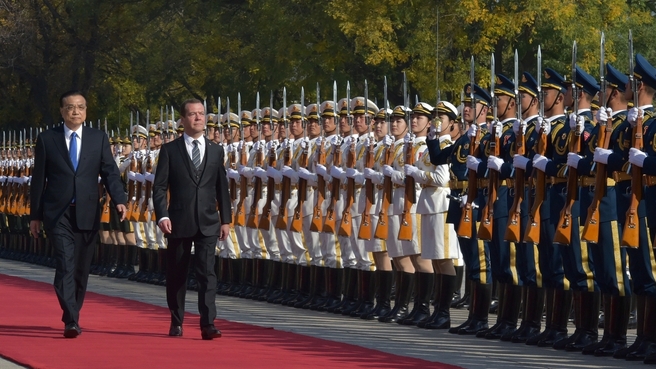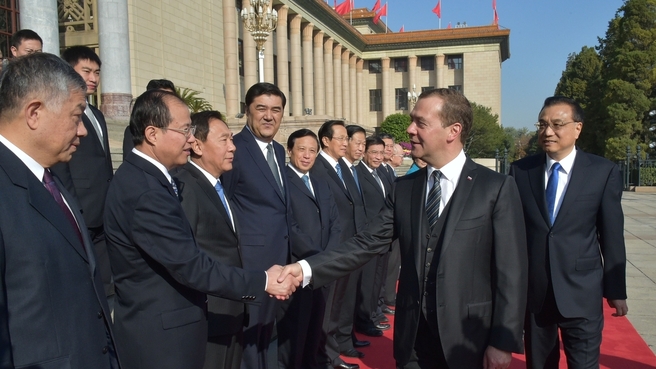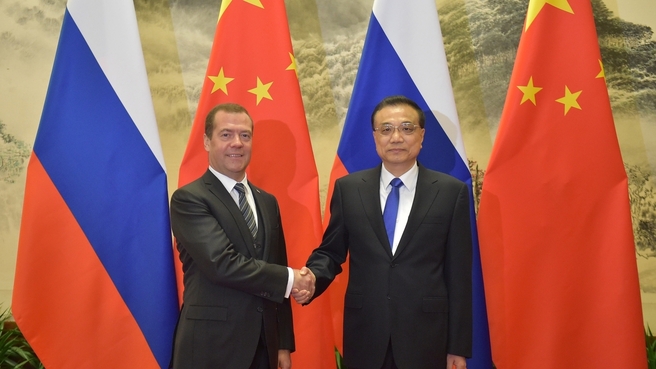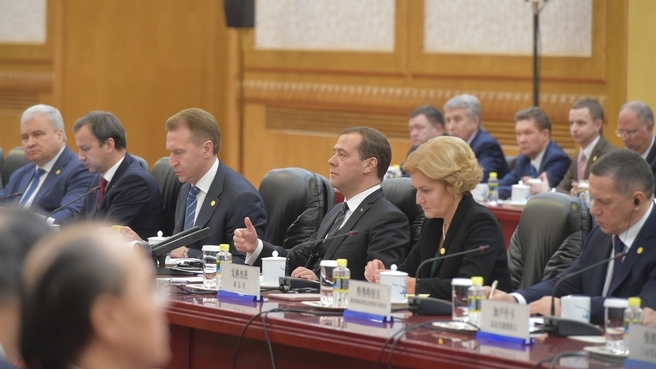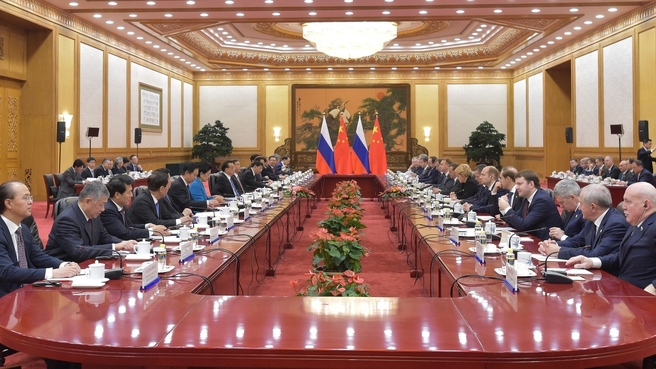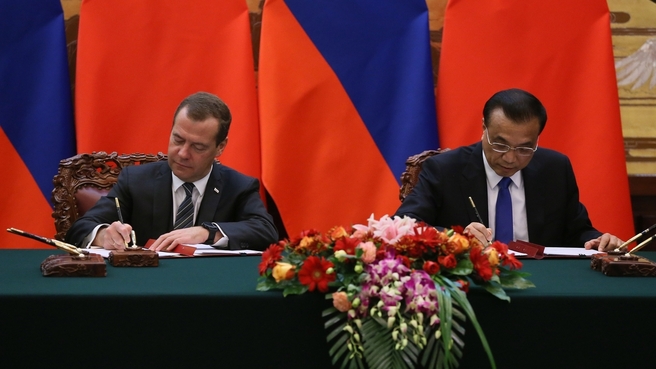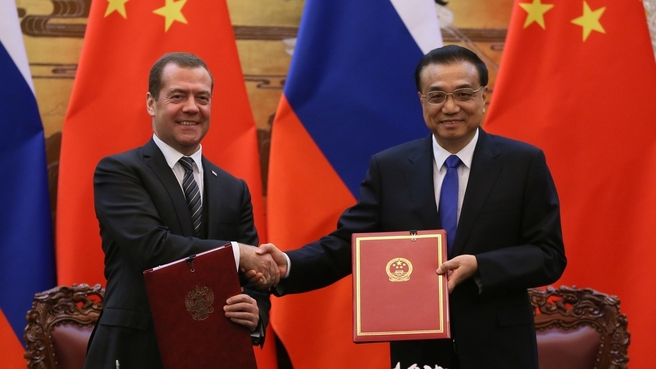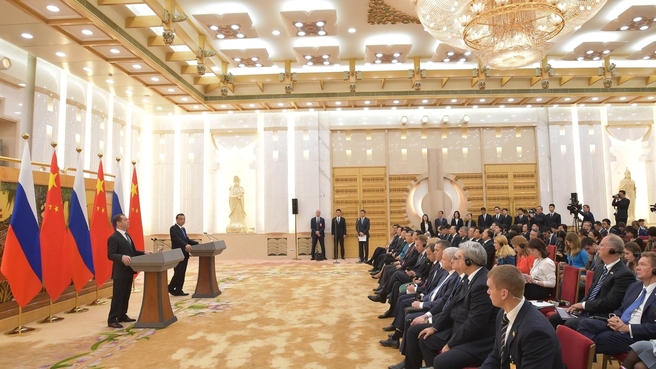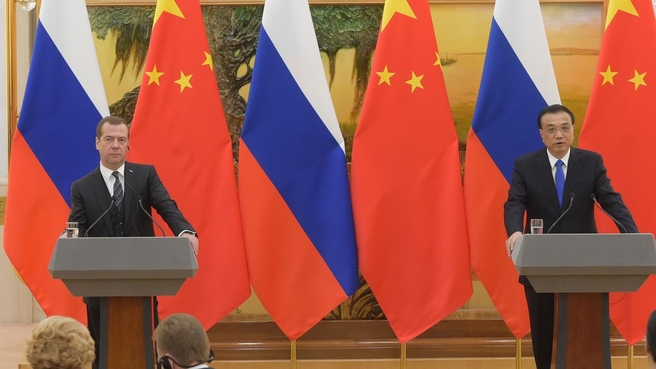Dmitry Medvedev: “Our relations are at an all-time high, the highest in our entire centuries-long history. We have achieved positive results in all areas. In January−August 2017 mutual trade volume grew by 35 percent.”
Dmitry Medvedev’s remarks at the 22nd regular meeting of Russian and Chinese heads of government
News conference by Dmitry Medvedev and Li Keqiang
Excerpts from Dmitry Medvedev’s speech at the 22nd regular meeting:
Dmitry Medvedev’s official visit to the People's Republic of China. Welcome ceremony
We have built up a great deal of potential for cooperation development and worked out ways to discuss the most pressing issues of Russian-Chinese strategic partnership and interaction.
The 19th National Congress of the Chinese Communist Party was highly publicised in Russia. A range of strategic decisions has been made that will determine the development of the People’s Republic of China for the next decades.
Our relations are at an all-time high, the highest in our entire centuries-long history. Right now, all formats of intergovernmental consultations are in place. We have maintained these consultations for 22 years, since 1996.
We have achieved positive results in all areas. In 2016, mutual trade volume grew by 4 percent and in January−August 2017 by 35 percent. We can maintain this positive trend in industry, transport, aircraft design, energy and the high-tech sectors.
Documents signed at 22nd regular meeting of Russian and Chinese heads of government
- Joint communique on the
results of the 22nd regular meeting of Russian and Chinese heads of
government
- Minutes of the 18th
meeting of the Russian-Chinese Commission for Cultural Cooperation
- Agreement between the
Federal Customs Service of the Russian Federation and the General
Administration of Customs of the People’s Republic of China on cooperation in
risk management
- Protocol between the Federal
Customs Service of the Russian Federation and the General Administration of
Customs of the People’s Republic of China on the exchange of data received via
the inspection and search system used as part of mutual recognition of the
results of customs control of certain kinds of goods, in order to improve
customs control
- Protocol between the
Agriculture Ministry of the Russian Federation and the General Administration
of Quality Supervision, Inspection and Quarantine of the People’s Republic of
China on phytosanitary requirements for wheat exported from the Russian
Federation to the People’s Republic of China
- Protocol between the
Agriculture Ministry of the Russian Federation and the General Administration
of Quality Supervision, Inspection and Quarantine of the People’s Republic of
China on phytosanitary requirements for sunflower seeds exported from the
Russian Federation to the People’s Republic of China
- Protocol between the
Agriculture Ministry of the Russian Federation and the General Administration
of Quality Supervision, Inspection and Quarantine of the People’s Republic of
China on phytosanitary requirements for buckwheat exported from the Russian
Federation to the People’s Republic of China
- Protocol between the
Agriculture Ministry of the Russian Federation and the General Administration
of Quality Supervision, Inspection and Quarantine of the People’s Republic of
China on phytosanitary requirements for flax seed exported from the Russian
Federation to the People’s Republic of China
- Protocol between the
Agriculture Ministry of the Russian Federation and the General Administration
of Quality Supervision, Inspection and Quarantine of the People’s Republic of
China on phytosanitary requirements for oat exported from the Russian
Federation to the People’s Republic of China
- Agreement on establishing
sister relationship between the Republic of Karelia (Russian Federation) and
Fujian Province (People’s Republic of China)
- Agreement on trade,
economic, research, technical, social and cultural cooperation between the
Government of the Republic of Karelia (Russian Federation) and the People’s
Administration of Fujian Province (People’s Republic of China)
- Cooperation development
programme in space exploration between Roscosmos state corporation on space
activities (Russian Federation) and the China National Space Administration
(People’s Republic of China) for 2018−2022
- Memorandum of understanding
on wide cooperation between NOVATEK and the China Development Bank
- Framework agreement between
the Bank for Development and Foreign Economic Affairs (Vnesheconombank) and the
Export-Import Bank of China
- Agreement on strategic
cooperation between NOVATEK and the China National Petroleum Corporation
- Minutes of the 4th
meeting of the Russian-Chinese Intergovernmental Commission for Investment
Cooperation
- Minutes of the 14th
meeting of the Russian-Chinese Intergovernmental Commission for Energy
Cooperation
- Minutes of the 21st
meeting of the Russian-Chinese Commission for Preparing Regular Meetings of Heads
of Government
- Minutes of the 1st
meeting of the Russian-Chinese Intergovernmental Commission for Cooperation and
the Development of the Russian Far East and Baikal Region and the Northeast of
the People’s Republic of China
News conference by Dmitry Medvedev and Li Keqiang following the 22nd regular meeting of the prime ministers of Russia and China
Excerpts from the transcript:
Li Keqiang: The 22nd regular meeting of Chinese and Russian heads of government focuses on expanding practical cooperation. We have reached our goals; the meeting went quite well. We also attended a ceremony where bilateral documents were signed.
Chinese-Russian relations of comprehensive strategic partnership continue to develop at a high level; contacts at the high and top levels have intensified and mutual political trust in international and regional affairs as well as strategic cooperation are being developed.
We also praise the current level of trade ties between the two countries, especially since the beginning of this year. Mutual trade is growing fast. We have agreed on the further improvement and expansion of bilateral trade as well as the implementation of planned joint projects so as to be able to see results as soon as possible.
It is important for us to bring the best out of cooperation in traditional areas, as well as to develop and agree on new large joint projects plus expand new cooperation areas.
China is going to host an imports fair next year. Russian products will find their Chinese consumers and will get a bigger share on the Chinese market.
We also discussed cooperation on the eastern route of the Yamal LNG gas pipeline, the second section of the China-Russia oil pipeline and the implementation of other major projects. It is important to find new forms of energy cooperation based on these projects. In particular, cooperation and integrated interaction from upstream to downstream.
It is important to strengthen cooperation in innovations, the field of high-tech , space, aviation and aircraft design. We still have a big potential for that.
The first joint university on the basis of the Polytechnic University and Lomonosov Moscow State University opened this year. We hope that it will not just be an institution of higher learning important for both countries, but will also gain a reputation abroad.
Today the Prime Minister and I will close the years of the Russian and Chinese media and finalise the results of the two years. We are working on the possibility to hold other cross-years.
China and Russia are great countries that are each other’s largest neighbours with wide development opportunities. Together with the Russian party, we are ready to implement agreements that our leaders reach, assist cooperation as part of various systems, implement the existing cooperation results based on mutual benefit and respect, mutual development, plus develop bilateral relations together with multidimensional cooperation for the sake of a new type of international relations.
Dmitry Medvedev: I have congratulated Premier of the State Council of China Li Keqiang, all our Chinese colleagues and the Chinese people on the success of the 19th Congress of the Communist Party of China. The Congress’ decisions have determined the country’s future and will boost comprehensive partnership and forward-looking cooperation with Russia, as well as our interaction within a wide range of formats, including that of multilateral nature.
The mechanism of interaction between our governments is working very well. It is a good mechanism. We have five very effective field-specific commissions. Both the Russian and the Chinese governments are contributing to the development of projects in various spheres of our cooperation.
Over the past year, we have signed several intergovernmental, interdepartmental and interregional documents on cooperation in various spheres, including agriculture, customs, space exploration and interregional cooperation. Of course, Russian and Chinese companies and financial institutions maintain large-scale multifaceted cooperation.
Despite the global economic downturn, Russian-Chinese cooperation has rebounded. Over the past few years, our trade has not decreased but has grown, including by over 30 percent in the first eight months of this year. We hope our trade will continue to grow in keeping with the goals that have been formulated some time ago, and that it will ultimately reach the target figure. As you remember, the target figure is $100 billion, but it is not the limit at all.
We are implementing huge projects, including cross-border ones. One such breakthrough project is the Eurasian Transport Corridor to link China, Russia and the EU countries.
We are working to implement ambitious transport project, such as the creation of a wide-body long-distance civilian plane, which has been given a name already. We are working on a heavy civilian helicopter and space exploration: we have signed a programme for our work on these projects.
We have approved a package of 73 priority
investment projects, 17 of which are being implemented with some $15 billion of
attracted investment. We have agreed to pay more attention to the sphere of
innovations and to consider the possibility of creating a special fund to
finance innovative research.
The first stage of the Yamal LNG plant will come on stream in the near future. The first batch of gas via the eastern route of the Power of Siberia pipeline will be delivered in late 2019. We will continue coordinating gas deliveries via the western route and will boost these talks.
It is very important to continue our cooperation in other science-intensive spheres such as nuclear generation.
The number of people studying Russian and Chinese is increasing with every passing year. The scope of our cultural and education projects is increasing, along with the number of students. A joint Russian-Chinese University based on Moscow State University and Beijing University of Technology has opened at Shenzhen.
We have held regular cross years starting in 2007. The latest examples are the media cross years in 2016 and 2017.
Question: We know that the US dollar continues to hold leading positions in the international settlement system, and the payment systems continue to be dominated by transnational companies such as Visa and MasterCard. Some experts believe that this can disturb the balance in the international financial system and lead to economic inequality. What should be done in this situation?
Dmitry Medvedev: The world needs a balanced system of financial relations based on various reserve currencies and settlement systems. No one currency must dominate the market, because this makes all of us dependent on the economic situation in the country that issues this reserve currency, even when we are talking about a strong economy such as the United States. Even the US economy encounters periodic problems, which causes turbulence in the entire financial world. Therefore, the more balanced the international financial system, the better for everyone.
The yuan, the national currency of China that represents one of the world’s largest economies, is playing an increasingly big role. We are discussing the possibility of using our national currencies, the rouble and the yuan, for mutual settlements and also using such tools as swaps. We are also analysing the possibilities of national payment systems, including China’s UnionPay. Russia is developing a national payment system based on the Mir card. We are discussing the possibility of connecting the Mir card to Chinese payment systems based on co-badged cards, that is, cards that include two payment brands and so can be used in settlement transactions in Russia and other countries. These cards have a good future in that they will help us evade the problems that are sometimes created by the use of American payment systems such as Visa or MasterCard. The more financial tools we have in the world the more stable the international financial system.
Question: What do you think will be the future of relations between our countries?
And another question: at the previous ministerial meeting you suggested focusing on key aspects such as cooperation between small-sized businesses and cooperation on the development of the Russian Far East. How is it going?
Li Keqiang: The 19th National Congress of the Communist Party of China concluded successfully last week. The congress was quite open; we invited many foreign correspondents, including Russian ones who provided a broad coverage of the event.
During the talks we mentioned that the Russian side considers the 19th Congress, as well as important decisions related to next year’s development, an opportunity for the development of Russia. We always consider each other’s development as the opportunity for our own development, because we are strategic partners, we have trust in each other and share common interests for the sake of mutually beneficial cooperation.
No doubt we have even bigger opportunities for cooperation ahead. We need a balance to preserve peace and stability in the world. Balance is also important for the improvement of security. And again, we need to find a new balancing point for the development of Russian-Chinese relations.
Therefore, last year in St Petersburg Mr Medvedev and I expressed hope and intent to strengthen cooperation related to small and medium-sized businesses, as well as the development of the Russian Far East.
It is important to find new fields of cooperation because we have a very sound foundation for the traditional cooperation areas (such as energy, aircraft design and space exploration) and they are developing fast.
What I am talking about is that it is important to use the capacities and advantages of large joint projects. No less important is to show the advantages and flexibility of cooperation between small and medium-sized businesses to achieve mutually complementing cooperation, form new growth points as well as achieve the goals and results that will exceed our expectations.
The Far East is a very vast space and has a huge potential for the future development of Russia. We believe that China’s biggest advantage is the domestic demand and the country’s western and middle regions have even bigger development potential. If we manage to boost cooperation in the Russian Far East, we will be able to form as well as expand the new space for the further development of cooperation.
During the talks we reached new agreements on cooperation in the Russian Far East. We are going to increase China’s investments in order to develop the region and we are ready to increase imports of Russian energy.
China supports its tourists who want to go to Russia and its Far East. We will not allow illegal fishing; Russia and China will improve cooperation in this area.
We have a very solid base for the development of our countries, for cooperation. We are looking for new growth points and new cooperation areas in the interests of our people, peace and stability in the world.
